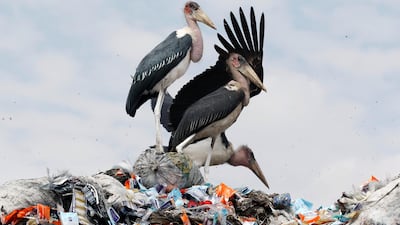France will ban the use of single-use containers, plates, cups and tableware for people dining in restaurants as part plans to combat waste and boost recycling.
The rule, which for many has upended business models based on disposable packaging and utensils, comes into force on January 1.
Fast-food outlets in France generate an estimated 180,000 tonnes of waste from six billion meals a year.
“It's an emblematic measure that if properly implemented will make a very concrete difference for people — it definitely goes in the right direction,” said Moira Tourneur of non-profit Zero Waste France.
But the law has drawn criticism from the European Paper Packaging Alliance, which argues that most single-use containers are made of renewable resources and have a recycling rate of 82 per cent across the European Union.
It also says making and washing durable items consumes more energy and water.
Restaurants have noted as well that clients often take reusable cups with them after a meal or end up throwing plates and cutlery in the trash instead of returning them.
After several months of testing, the Subway sandwich chain found it needed to mount a “public awareness effort” with franchise operators that included new posters to inform clients to reuse tableware, a spokeswoman said.
At a McDonald's in the Paris suburb of Levallois-Perret, manager Maria Varela said they needed to hire an additional dishwasher and more hosts to explain that plates, knives and forks must now be separated from trash.
Marabou storks stand on a pile of recyclable plastic material — in pictures
“At first it was very complicated, both at the counter and with table service,” she said, noting that the kitchen had to be remodelled to cope with the new requirements.
“Everything that was in cardboard is now in reusable plastic. We had to rethink everything in the kitchen, separate takeout from on-site orders, create new storage space.”
Pressure groups worry the additional requirements might lead fast-food operators to resist.
Several organisations including Surfrider, Zero Waste France and No Plastic in My Sea have urged clients to “sanction the chains that don't respect the law” by taking their business elsewhere.
“I didn't know about this but it's good that it's mandatory,” said Tom Fresneau, 16, who was eating a burger with a friend at the McDonald's outside the French capital.
“But it does cost more than paper and cardboard, so I understand if it's problematic for the smaller fast-food restaurants that might have to raise their prices.”
Many other countries are introducing changes to drastically reduce the amount of plastic that ends up in the environment.
Abu Dhabi recently announced it had reduced the use of single-use plastic bags in retail stores by 87 million since the emirate introduced a ban on June 1.
The Environment Agency — Abu Dhabi said the reduction is equivalent to half a million bags a day, with the overall use of single-use plastic bags down by more than 90 per cent.











